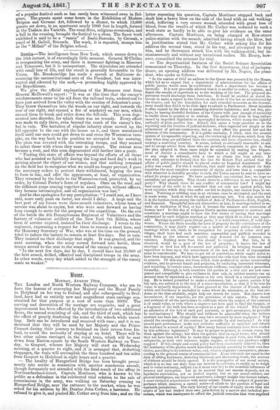larrira.—The intelligence from New York, which comes down to the
10th instant, is of exceedingly little moment. General M'Clellan is reorganizing the army, and there is incessant fighting in Missouri and Tennessee, but it is unimportant. The skirmishes are attended with small loss of life, and the result is generally favourable to the Union. Mr. Breckenridge has made a speech at Baltimore de- nouncing the unconstitutional acts of the President, but was inter- rupted and silenced by the mob,—a proceeding highly approved by the Republicans. We give the official explanations of the Manassas rout from General McDowell's report : "It was at this time that the enemy's reinforcements came to his aid from the railroad train, understood to have just arrived from the valley with the residue of Johnston's army. They threw themselves into the woods on our right, and towards the rear of our right, and opened a fire of musketry on our men, which caused them to break and retire down the hill-side, This soon dege- nerated into disorder, for %/Leh there was no remedy. Every effort was made to rally them, even beyond the reach of the enemy's fire, but in vain. The battalion of regular infantry alone moved up the hill opposite to the one with the house on it, and there maintained itself until our men could get down to and cross the Warrenton turn- pike, on the way back to the position we occupied in the morning. The plain was covered with the retreating troops, and they seemed to infect those with whom they came in contact. The retreat soon became a rout, and this soon degenerated still further into a panic. " Finding this state of affairs was beyond the efforts of all those who had assisted so faithfully during the long and hard day's work in gaining almost the object of our wishes, and that nothing remained on the field but to recognize what we could no longer prevent, I gave the necessary orders to protect their withdrawal, begging the men to form in line, and offer the appearance, at least, of organization. They returned by the fords to the Warrenton-road, protected, by my order, by Colonel Porter's force of regulars. Once on the road, and the different corps coming together in small parties, without officers, they became intermingled, and all organization was lost."
And he thus apologizes for any precipitation: "I could not, as I have said, more early push on faster, nor could I delay. A large and the best part of my forces were three-month volunteers, whose term of service was about to expire, but who were sent forward as having long enough to serve for the purpose of the expedition. On the eve of the battle the 4th Pemisylvainan Regiment of Volunteers and the battery of volunteer artillery of the New York 8th Militia, whose term of service expired, insisted 'on their discharge. I wrote to the regiment, expressing a request for them to remain a short time, and the Honorary Secretary of War, who was at the time on the ground, tried to induce the battery to remain at least five days. But m vain. They insisted on their discharge that night. It was granted, and the next morning, when the army moved forward into battle, these troops moved to the rear to the sound of the enemy's cannon.
"In the next few days, day by day, I should have lost 10,000 of the best armed, drilled, officered and disciplined troops in the army. In other words, every day which added to the strength of the enemy made us weaker."






























 Previous page
Previous page